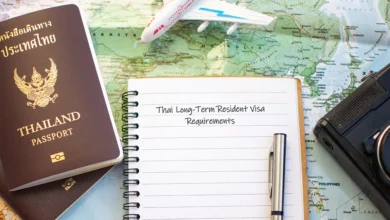Retirement marks a new chapter—one that should be filled with peace, fulfillment, and maybe even a little adventure. If you’re dreaming of trading your 9-to-5 for sunshine, retire in thailand sea breezes, and a lower cost of living, retiring in Thailand may be exactly what you need.
In this guide, we’ll explore how to transition from working life to worry-free retirement in one of the world’s most welcoming and affordable countries: Thailand.
Why Thailand?
Thailand is often called the “Land of Smiles”, and it’s not just a tourism slogan. The locals are friendly, the pace of life is relaxed, and the quality of life is surprisingly high—especially for retirees. Here’s what makes it such a popular destination:
1. Live Well on Less
One of the main reasons retirees choose Thailand is its affordability. Your money simply goes further here.
-
Housing: A comfortable, furnished apartment or house can be rented for $400–$800/month depending on the city and proximity to the beach or center.
-
Food: Eat out every day if you like—local meals cost around $2–$3, and even high-end dining is reasonably priced.
-
Utilities & Internet: Monthly expenses for electricity, water, and high-speed internet usually fall under $100.
Compared to Western cities, your retirement income in Thailand can support a more luxurious and less stressful lifestyle.
2. A Climate Made for Relaxing
Say goodbye to winter forever. Thailand’s tropical climate offers warm weather year-round, with temperatures typically ranging from 25°C to 35°C (77°F to 95°F). You’ll enjoy endless sunny days ideal for:
-
Beach walks and swimming
-
Morning yoga by the ocean
-
Al fresco dining and outdoor markets
Although the rainy season (May to October) brings short, heavy showers, many retirees find it refreshing and easy to adjust to.
3. World-Class Yet Affordable Healthcare
Healthcare is a big concern for retirees, and Thailand delivers exceptional value. The country’s private hospitals—especially in cities like Bangkok, Chiang Mai, and Phuket—offer:
-
English-speaking staff
-
Modern facilities
-
Highly trained doctors
-
Low-cost treatments and checkups
For example, a routine doctor’s visit may cost $30–$50, retire in thailand and surgeries can be 70–80% cheaper than in the U.S. Many expats purchase private insurance, while others pay out of pocket due to the affordability.
4. Retirement-Friendly Visa Options
Thailand makes it relatively easy for retirees to stay long-term with the Non-Immigrant O or OA Visa. Here’s what you need:
-
Be at least 50 years old
-
Have 800,000 THB (
$22,000 USD) in a Thai bank account, or a monthly income of 65,000 THB ($1,800 USD) -
Renew the visa annually
-
Health insurance may be required depending on visa type
You’ll also need to report your address every 90 days, but this is a straightforward process.
5. Endless Lifestyle Options
Whether you crave calm, culture, or coastline, Thailand has a city or town for you.
-
Chiang Mai: Mountain views, cooler weather, rich culture, and a peaceful pace.
-
Bangkok: A bustling capital with modern comforts, top-notch hospitals, and great shopping.
-
Pattaya & Hua Hin: Beach towns with large expat populations and great golf courses.
-
Phuket & Koh Samui: Island living with luxury resorts and laid-back charm.
Retirees can choose between tranquil, slow-paced living or energetic city life—or enjoy both, depending on the season.
6. Vibrant Expat Communities
Thailand is home to thousands of retirees from all over the world, especially in expat hubs like:
-
Hua Hin
-
Chiang Mai
-
Pattaya
-
Bangkok
You’ll find support groups, social clubs, and activity meetups, which makes settling in easier and more enjoyable. Many expats report that they feel safer and more socially connected in Thailand than they did back home.
7. Activities to Enrich Your Golden Years
Thailand isn’t just a place to relax—it’s a place to grow and explore. You can fill your days with:
-
Volunteering in local communities or teaching English part-time
-
Taking classes—Thai cooking, yoga, painting, or even martial arts
-
Traveling to nearby countries like Vietnam, Laos, and Malaysia
-
Spiritual exploration in Buddhist temples or meditation retreats
With your time and money freed up, retirement becomes an opportunity for personal growth.
8. Practical Considerations
Before making the move, it’s important to plan carefully:
-
Visit First: Spend a few months in different regions to see where you feel most at home.
-
Healthcare: Research health insurance options or plan a budget for out-of-pocket care.
-
Banking: You’ll need a Thai bank account for visa purposes and convenience.
-
Cultural Etiquette: Learn a bit of Thai and understand local customs to ease your transition.
Real Talk: Is Thailand Right for You?
Thailand is not for everyone. The heat can be intense, some government processes are slow or confusing, and language barriers still exist in less touristy areas. But if you’re flexible, open-minded, and curious about new cultures, the rewards are immense.
Final Thoughts
Retiring comfortably in Thailand isn’t just about moving to a cheaper place—it’s about moving toward a better way of life. It’s a place where your money stretches further, your days are filled with sunshine, and your lifestyle feels more aligned with peace and happiness.
If you’re ready to swap paychecks for palm trees, consider this your invitation to start planning your dream retirement in Thailand.





